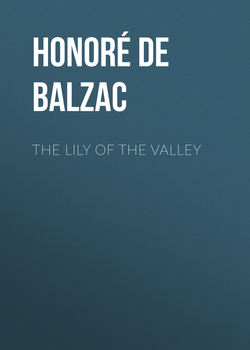The Lily of the Valley

Реклама. ООО «ЛитРес», ИНН: 7719571260.
Оглавление
Honoré de Balzac. The Lily of the Valley
THE LILY OF THE VALLEY
CHAPTER I. TWO CHILDHOODS
CHAPTER II. FIRST LOVE
CHAPTER III. THE TWO WOMEN
ADDENDUM
Отрывок из книги
To what genius fed on tears shall we some day owe that most touching of all elegies, – the tale of tortures borne silently by souls whose tender roots find stony ground in the domestic soil, whose earliest buds are torn apart by rancorous hands, whose flowers are touched by frost at the moment of their blossoming? What poet will sing the sorrows of the child whose lips must suck a bitter breast, whose smiles are checked by the cruel fire of a stern eye? The tale that tells of such poor hearts, oppressed by beings placed about them to promote the development of their natures, would contain the true history of my childhood.
What vanity could I have wounded, – I a child new-born? What moral or physical infirmity caused by mother’s coldness? Was I the child of duty, whose birth is a mere chance, or was I one whose very life was a reproach? Put to nurse in the country and forgotten by my family for over three years, I was treated with such indifference on my return to the parental roof that even the servants pitied me. I do not know to what feeling or happy accident I owed my rescue from this first neglect; as a child I was ignorant of it, as a man I have not discovered it. Far from easing my lot, my brother and my two sisters found amusement in making me suffer. The compact in virtue of which children hide each other’s peccadilloes, and which early teaches them the principles of honor, was null and void in my case; more than that, I was often punished for my brother’s faults, without being allowed to prove the injustice. The fawning spirit which seems instinctive in children taught my brother and sisters to join in the persecutions to which I was subjected, and thus keep in the good graces of a mother whom they feared as much as I. Was this partly the effect of a childish love of imitation; was it from a need of testing their powers; or was it simply through lack of pity? Perhaps these causes united to deprive me of the sweets of fraternal intercourse.
.....
At this particular time Monsieur de Chessel’s ambition had a second dawn. Royalty smiled upon him, and he was now affecting the grand manner. Still he was, I must say, most kind to me, and he pleased me for the very simple reason that with him I had found peace and rest for the first time. The interest, possibly very slight, which he showed in my affairs, seemed to me, lonely and rejected as I was, an image of paternal love. His hospitable care contrasted so strongly with the neglect to which I was accustomed, that I felt a childlike gratitude to the home where no fetters bound me and where I was welcomed and even courted.
The owners of Frapesle are so associated with the dawn of my life’s happiness that I mingle them in all those memories I love to revive. Later, and more especially in connection with his letters-patent, I had the pleasure of doing my host some service. Monsieur de Chessel enjoyed his wealth with an ostentation that gave umbrage to certain of his neighbors. He was able to vary and renew his fine horses and elegant equipages; his wife dressed exquisitely; he received on a grand scale; his servants were more numerous than his neighbors approved; for all of which he was said to be aping princes. The Frapesle estate is immense. Before such luxury as this the Comte de Mortsauf, with one family cariole, – which in Touraine is something between a coach without springs and a post-chaise, – forced by limited means to let or farm Clochegourde, was Tourangean up to the time when royal favor restored the family to a distinction possibly unlooked for. His greeting to me, the younger son of a ruined family whose escutcheon dated back to the Crusades, was intended to show contempt for the large fortune and to belittle the possessions, the woods, the arable lands, the meadows, of a neighbor who was not of noble birth. Monsieur de Chessel fully understood this. They always met politely; but there was none of that daily intercourse or that agreeable intimacy which ought to have existed between Clochegourde and Frapesle, two estates separated only by the Indre, and whose mistresses could have beckoned to each other from their windows.
.....